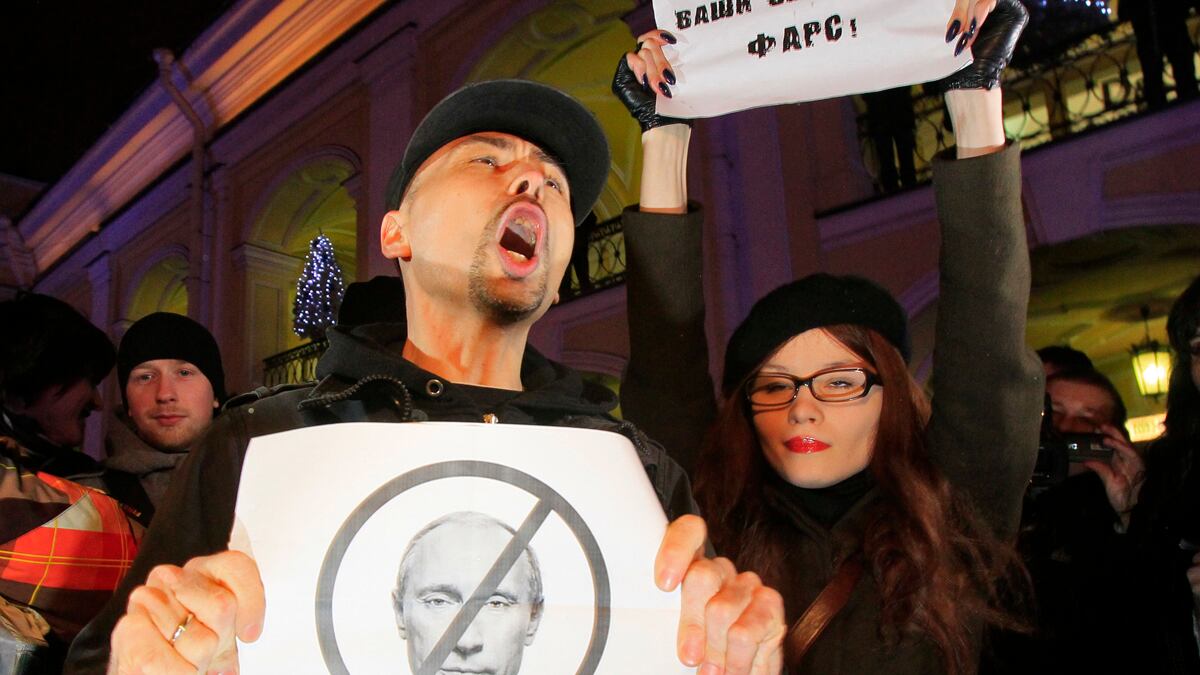As thousands of riot police moved in to break protesters’ heads on the streets of Moscow and St Petersburg in the wake of Russia’s rigged parliamentary election, Sen. John McCain gleefully tweeted "Vlad—the Arab Spring, coming soon to a neighborhood near you."
But he's wrong. the 60,000-strong opposition rally last Saturday was the biggest antigovernment protest since the fall of communism. But Moscow’s Bolotnaya Square isn’t Cairo’s Tahrir Square, and Vladimir Putin isn’t about to be unseated by a wave of popular anger. Yes, the protests are the biggest challenge the Putin regime has seen since tens of thousands of pensioners took to the streets in 2005 to protest cuts.
And yes, the majority of Russians voted against United Russia, the official Kremlin-backed party that took, by its own crooked count, 49.5 percent of the vote. But the protesters on the streets of Russia’s largest cities still represent only a tiny sliver of Russian society. Among them are many of Russia's brightest, best and undoubtedly most media savvy. But the numbers are still tiny. Only 3 percent voted for the only liberal party allowed to participate in the elections (or if you take their own account, 6 percent). They is no Muslim Brotherhood in waiting. Some leaders of A Just Russia (14 percent) and the Communists (20 percent) have backed the protests—but so far there’s no sign that their voters are willing to follow them in their hundreds of thousands onto the streets.

What Putin has on his hands is a democracy-management problem, not a revolution problem. His spinmeisters messed up—first in chickening out of the creation of a tame liberal party headed by oligarch Mikhail Prokhorov that would have deflected much of the current protests, and again in the clumsy handling of massive electoral fraud. The Kremlin’s sinister ideologue in chief, Vladislav Surkov (creator of Russia’s “managed democracy,” as well as being a novelist, poet, and former employee of jailed oligarch Mikhail Khodorkovsky) put his finger on it in a rare interview this week. The "urban discontented" must be brought into the political system, he said. True to form, Prokhorov popped up again this week announcing that he would run against Putin for the presidency in March—and drawing accusations that he was a Kremlin-approved liberal stalking horse. And Putin will win anyway, of course.
This is no Arab Spring, because unlike Mubarak and his ilk, Putin still has many options. He could play the good tsar, for instance, distance himself from United Russia, instigate some high-profile sacking, and maybe corruption trials. Last month Putin wrong-footed a panel of foreign Russia watchers when he disarmingly agreed to a slew of accusations they leveled—from the need for more pluralism in the political system to systemic corruption. Whether he’s willing or able to do anything about them is a different question.
But Sunday's vote was not so much a vote personally against Putin as a vote against endemic corruption that ordinary Russians encounter in their everyday lives. As veteran commentator Yulia Latynia wrote earlier this month, 99 percent of the Russians who voted against Putin probably haven't heard of the anticorruption blogger Alexei Navalny, who has become the figurehead of the protest movement. But each and every one of them has personal experience of the rottenness of the system.
Navalny is a lawyer by training who has systematically publicized evidence of massive official corruption on the Internet—and was imprisoned for 15 days after the postelection protests for refusing to obey a policeman’s orders. He is by far the most important figure in the opposition precisely because he speaks to the central political concern of most Russians, which is corruption—not press freedom, not concern about Putin's rearmament spree or crackdown on immigrants or poisoning defectors or jailing dissidents and rebel oligarchs. On the contrary, the evidence is that the Russian man in the street loves all that stuff (according to a recent survey Russians prioritize “order” over “democracy” by three to one). But what ordinary folk object to is the thieving of the state’s servants, the abuse of power, the systematic extortion by police and the sheer vast dead hand of bureaucracy that has killed off Russia's real economy. That's why Navalny's message gets far, far more traction than all the liberal politicians and their griping put together (even though thanks to Kremlin control of the mainstream media he is still a national figure only to Russian Netizens). But Navalny's politics are strongly nationalist, not pro-Western and liberal, and he recently joined an anti-immigrant "Russian March."
The key point is that the vast majority of Russians don't like liberals (whom they see as Western stooges), they don't like democrats (whom they believe ruined the country), and they don't like the idea of revolution (understandable, since the last two didn't turn out so great for most of them). Above all, they're politically apathetic—discontented, but not angry. Saturday’s rally was an impressive and galvanizing moment for the opposition, and unlike previous rallies it was too big to be crushed viciously or for state-owned TV to ignore (though the rally was reported as a protest against election fraud rather than Putin himself). But the truth is that more New Yorkers showed up at Black Friday sales than all the Russian antigovernment protests put together. This is not Russia taking to the streets in outrage as happened in 1991 (or 1917), and it won’t be until—God forbid—economic crisis meets a crisis of legitimacy, the deadly potion behind all Russia’s revolutions.
Earlier this month Putin was cat-called at a boxing match by regular blokes who should have been his core supporters. That this was a watershed moment for the Putin regime. And these elections mark the beginning of a crisis of legitimacy, because for the first time a large swathe of Russia has registered its discontent—and has been roundly ignored by the Kremlin. But the threat to the regime comes not from the protests, nor from the protesters and the urban intelligentsia constituency they represent. It’s the boxing fans that in Revolution Square and probably believe that liberal leader Boris Nemtsov and his ilk are on the payroll of the CIA. It's the silent majority that Putin needs to concentrate on after he cruelly bats aside the few thousand noisy protesters, because if he can’t convince them that he can rein in th abuses of his own state servants then his regime is doomed.






